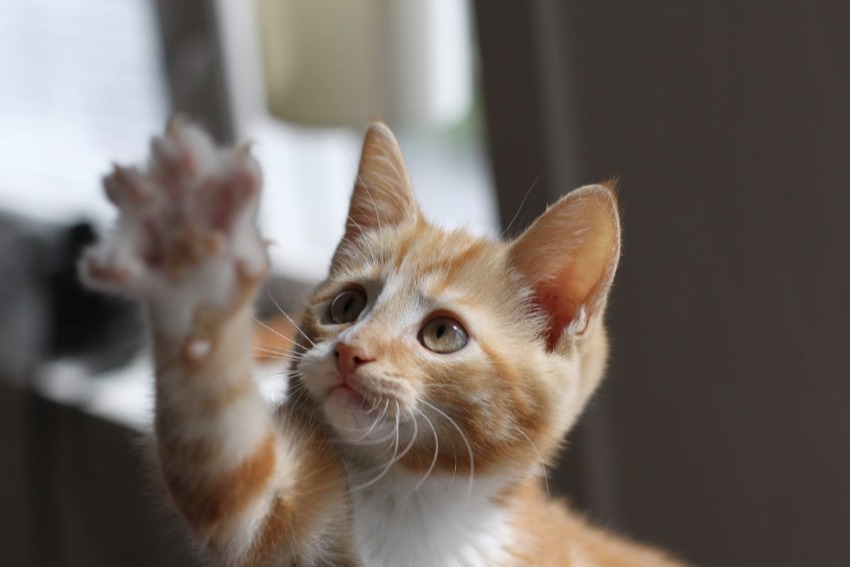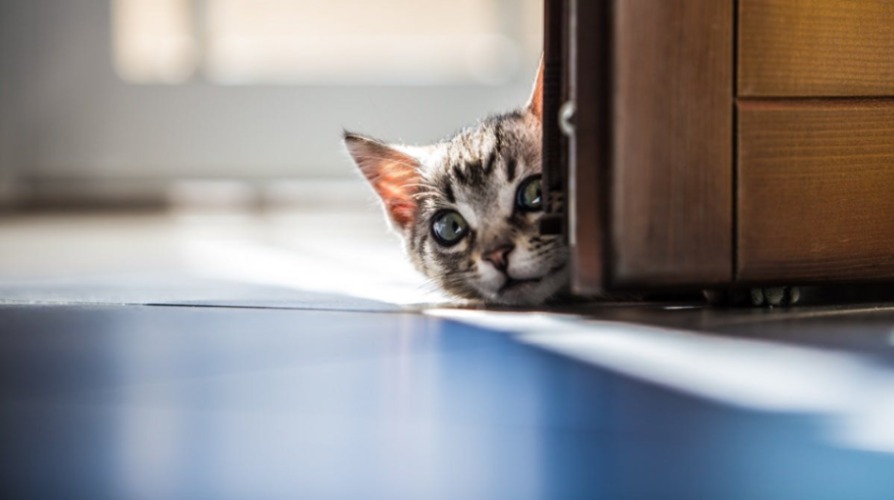Ready to help treat your pet to a healthy life?
When Do Kittens Calm Down? A Guide to Kitten Behavior Development
By : Kelli Rascoe & Trupanion Staff | Updated Sep 3, 2024

You just got a kitten, and they're so cute! They zip around and snuggle. Then they get back up and zip around again. Then they bat at some toys and climb and jump and zip around some more — wait a minute, when do kittens calm down?
If your new kitten is like the average feline their age, there's a good chance they love to play and explore. In fact, you may notice your kitten’s energy level is higher than expected. But does this change as they age into adult cats? We sat down with Trupanion veterinarian Dr. Sarah Nold to learn more about kitten behavior and get some tips to help our young cats burn off all the energy.
Understanding kitten growth stages
Your kitten develops at a rapid rate, and so too does their behavior. You may sometimes find it’s hard to keep up with them on a daily basis. The average kitten is certainly curious and can get into things quickly.
“Cats are evolutionarily nocturnal," Nold says. "When they’re in your home, you ask them to live according to your daytime schedules. However, this can go against what feels natural to them."
In order to understand when your kitten's bursts of energy tend to come out, it's worth taking a look at their growth timeline and what comes with each stage:
- Kittens begin social learning as early as two weeks of age. According to Nold, kittens "play, eat, and rest similar to a toddler."
- Social play usually peaks at about 3 months of age.
- Between 4 and 9 months, kittens hit their "teen" years. This means starting to feel their natural predatory selves and beginning to “hunt” and scavenge at odd hours of the night and day.
- From 9-14 months, kittens grow into themselves and begin to pattern their behavior more closely to their families.
While development happens in stages, every kitten is different. Some kitten and adult cats may develop quicker than others, and that is okay. Their home environment also plays a role.
"If there is another cat in the household to teach them, this process can be shorter,” Nold says.
Do kittens calm down like puppies do?
Puppies are often equated with big bursts of energy more than kittens are. But don’t disregard felines — as your kitten grows, they will likely exhibit their own surprising levels of energy. Though if your previous experience has only been with puppies, there are some key differences to expect with a young cat. Whereas the average puppy can be expected to calm down between 6 and 12 months of age, that's not quite the case for kittens.
“Cats are not small dogs. In general, we don’t even use the term ‘calm down’ for cats," says Nold. "Unlike dogs, your cat may place more importance on the security of their home than attachments to people or other cats. In other words, they may tend to be more solitary.”
Nold adds that kittens may continue to have energy while they learn, grow, and explore. While they may slow down on learning and exploring as they get used to their surroundings and grow older, their energy instead shifts toward instincts to govern their territory and "hunt" (be playful).
"It’s also important for your kitten or adult cat to feel comfortable at home," Nold says. "Consider creating a cat-friendly space that gives your best friend a chance to roam and get that energy out in a safe space."

What is normal kitten behavior?
Although you may feel a cat scratching or a cat biting as a negative behavior, it may just be a cat being a cat. Nold points out when to take notice of certain behaviors.
“Normal behavior may include scratching, which helps with your cat marking their territory and claw maintenance. You may see a cat scratching as bad behavior, especially if it happens to be on your favorite couch. Anything that threatens your cat’s security may cause stress and lead to behavior changes."
But if you're expecting your cat to just stop scratching or biting as they age, you may be in for a surprise. While these behaviors can be curbed into safer, more productive formats, they aren't likely to stop.
"In this sense, cats don’t 'calm down.' They are who they are," Nold says. "Some cats are playful and some are lazy. Enrichment may help cats express their normal predatory behaviors and help prevent boredom.”
Kitten enrichment tips to help with energy
Enrichment may provide mental, physical, and emotional stimulation for your cat. A cat-friendly home that includes enrichment may help curb any unwanted behaviors and keep your kitten's behavior productive rather than destructive.
Cat enrichment can come in many forms:
- Scratching posts
- Furniture, like cat trees and cat towers
- Windowsills and wall perches
- Catio
- Homemade cat toys
- Interactive play with a box
“Enrichment can also redirect normal scratching behavior from furniture to more appropriate furniture, like a cat scratching post," Nold says. "As a result, enrichment may help alleviate stress.”
It's also important to take time each day to play with your pet yourself — toys alone can't provide the same enrichment that you can as the pet owner. Interactive play is important for bonding with your cat and helping them settle into their new home. Besides, a break in your day to play with your cat may help with your own stress as well!

When to talk with your veterinarian
Sooner than you know, your kitten will be an adult cat. Kittens grow up fast, so take the time to interact, play and enjoy that time together. Some kittens may just be more energetic than others. But if you have any concerns about your cat’s development or behavior along the way, talk with your veterinarian. They can pinpoint any trouble areas and recommend a treatment plan. Of course, it's also important to get to know your cat's patterns and personality. If your usually high-energy kitten suddenly stops being so rambunctious, it could actually be a sign that something is wrong. Give your veterinarian a call — it's always better to be safe than sorry.
In the meantime, consider protecting your new cat's health with a pet insurance plan. No matter how calm or energetic your pet is naturally, there's no telling what kind of accidents or surprise illnesses could come their way in the future. Protecting them now is a good way to be prepared, even if you can't predict whether or not your kitten will ever calm down.
Want to learn more about feline behavior? Learn which cat behavior changes to watch out for.
